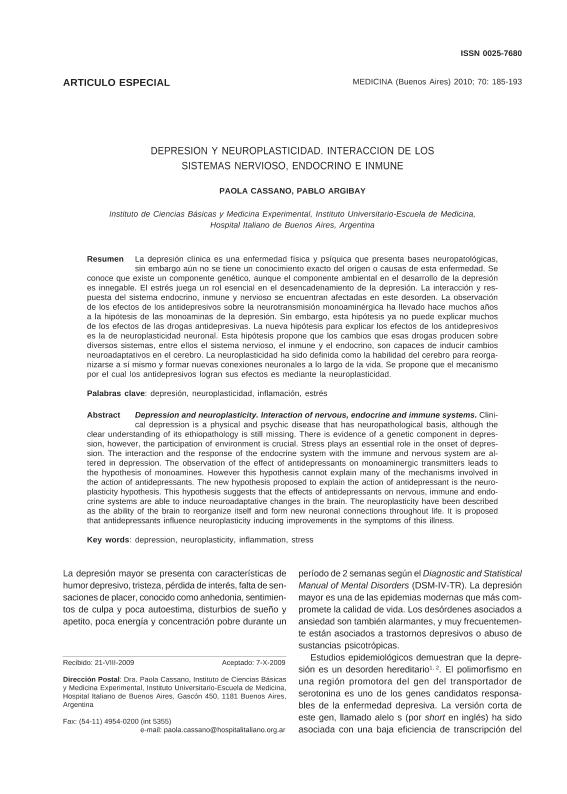Mostrar el registro sencillo del ítem
dc.contributor.author
Cassano, Paola Mariana

dc.contributor.author
Argibay, Pablo

dc.date.available
2018-07-31T22:00:21Z
dc.date.issued
2010-02
dc.identifier.citation
Cassano, Paola Mariana; Argibay, Pablo; Depresion y neuroplasticidad: interaccion de los sistemas nervioso, endocrino e inmune.; Medicina (Buenos Aires); Medicina (Buenos Aires); 70; 2; 2-2010; 185-193
dc.identifier.issn
0025-7680
dc.identifier.uri
http://hdl.handle.net/11336/53711
dc.description.abstract
La depresión clínica es una enfermedad física y psíquica que presenta bases neuropatológicas, sin embargo aún no se tiene un conocimiento exacto del origen o causas de esta enfermedad. Se conoce que existe un componente genético, aunque el componente ambiental en el desarrollo de la depresión es innegable. El estrés juega un rol esencial en el desencadenamiento de la depresión. La interacción y respuesta del sistema endocrino, inmune y nervioso se encuentran afectadas en este desorden. La observación de los efectos de los antidepresivos sobre la neurotransmisión monoaminérgica ha llevado hace muchos años a la hipótesis de las monoaminas de la depresión. Sin embargo, esta hipótesis ya no puede explicar muchos de los efectos de las drogas antidepresivas. La nueva hipótesis para explicar los efectos de los antidepresivos es la de neuroplasticidad neuronal. Esta hipótesis propone que los cambios que esas drogas producen sobre diversos sistemas, entre ellos el sistema nervioso, el inmune y el endocrino, son capaces de inducir cambios neuroadaptativos en el cerebro. La neuroplasticidad ha sido definida como la habilidad del cerebro para reorganizarse a sí mismo y formar nuevas conexiones neuronales a lo largo de la vida. Se propone que el mecanismo por el cual los antidepresivos logran sus efectos es mediante la neuroplasticidad.
dc.description.abstract
Clinical depression is a physical and psychic disease that has neuropathological basis, although the clear understanding of its ethiopathology is still missing. There is evidence of a genetic component in depression, however, the participation of environment is crucial. Stress plays an essential role in the onset of depression. The interaction and the response of the endocrine system with the immune and nervous system are altered in depression. The observation of the effect of antidepressants on monoaminergic transmitters leads to the hypothesis of monoamines. However this hypothesis cannot explain many of the mechanisms involved in the action of antidepressants. The new hypothesis proposed to explain the action of antidepressant is the neuroplasticity hypothesis. This hypothesis suggests that the effects of antidepressants on nervous, immune and endocrine systems are able to induce neuroadaptative changes in the brain. The neuroplasticity have been described as the ability of the brain to reorganize itself and form new neuronal connections throughout life. It is proposed that antidepressants influence neuroplasticity inducing improvements in the symptoms of this illness.
dc.format
application/pdf
dc.language.iso
spa
dc.publisher
Medicina (Buenos Aires)

dc.rights
info:eu-repo/semantics/openAccess
dc.rights.uri
https://creativecommons.org/licenses/by-nc-sa/2.5/ar/
dc.subject
Depression
dc.subject
Neuroplasticity
dc.subject
Nervous System
dc.subject
Endocrine System
dc.subject.classification
Medicina Critica y de Emergencia

dc.subject.classification
Medicina Clínica

dc.subject.classification
CIENCIAS MÉDICAS Y DE LA SALUD

dc.title
Depresion y neuroplasticidad: interaccion de los sistemas nervioso, endocrino e inmune.
dc.title
Depression and neuroplasticity: Interaction of nervous, endocrine and immune systems
dc.type
info:eu-repo/semantics/article
dc.type
info:ar-repo/semantics/artículo
dc.type
info:eu-repo/semantics/publishedVersion
dc.date.updated
2018-07-30T15:40:03Z
dc.identifier.eissn
1669-9106
dc.journal.volume
70
dc.journal.number
2
dc.journal.pagination
185-193
dc.journal.pais
Argentina

dc.description.fil
Fil: Cassano, Paola Mariana. Consejo Nacional de Investigaciones Científicas y Técnicas. Oficina de Coordinación Administrativa Parque Centenario. Instituto de Investigaciones Bioquímicas de Buenos Aires. Fundación Instituto Leloir. Instituto de Investigaciones Bioquímicas de Buenos Aires; Argentina
dc.description.fil
Fil: Argibay, Pablo. Consejo Nacional de Investigaciones Científicas y Técnicas. Oficina de Coordinación Administrativa Parque Centenario. Instituto de Investigaciones Bioquímicas de Buenos Aires. Fundación Instituto Leloir. Instituto de Investigaciones Bioquímicas de Buenos Aires; Argentina
dc.journal.title
Medicina (Buenos Aires)

dc.relation.alternativeid
info:eu-repo/semantics/altIdentifier/url/http://ref.scielo.org/y9p32v
Archivos asociados
